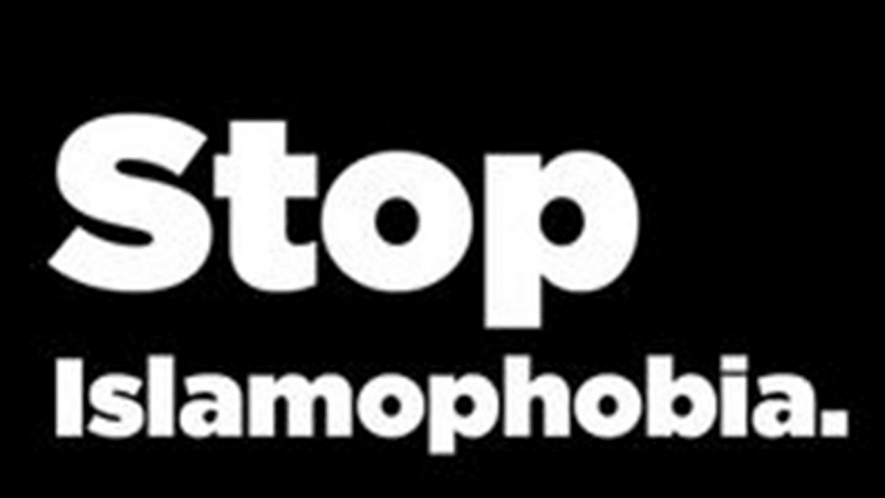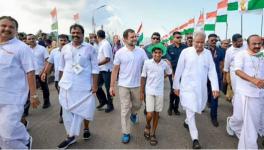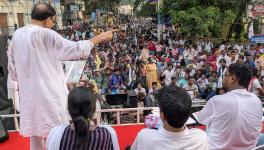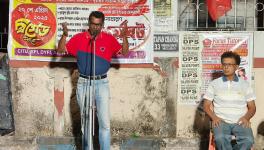Unscientific Epidemiological Example in Microbiology Textbook Promotes Islamophobia: Activists, Doctors Write Open Letter

Image Courtesy: pinterest
A group of doctors, researchers, academicians and social activists have written an open letter on March 21, raising concerns over the unscientific epidemiological practice and Islamophobia in a microbiology textbook, “Essentials of Medical Microbiology” authored by Dr Apurba S Sastry and Ds Sandhya Bhat.
While the book has been withdrawn by the publishers, the letter has been published as it highlights issues in the interest of ethical medical practice according to its authors.
Addressed to Dr Sastry, who is an associate professor at the Jawaharlal institute of Postgraduate Medical Education and Research, Puducherry, and Dr Bhat, who is a professor at the Pondicherry Institute of Medical Sciences, the letter criticises the “prejudiced choice of using as an epidemiological example, the Tablighi Jamaat (Society of Preachers) gathering organised in India between March 13-15, 2020”.
The letter, which has also been endorsed by several medical and health organisations as well as professionals, also highlights that the argument forwarded by the authors in using the aforementioned example lacks scientific merit and may “contribute to reinforcing the existing communalism and anti-minority targeting”. This is to be particularly noted “because functioning of and overall ethos at a number of higher education institutions including medical colleges in India reflects deeply entrenched oppressive social structures of the Indian society along gender, caste, religion, occupation, sexual orientation, geography, ethnicity etc.”
Following the undue focus on the Tabligh Jamaat congregation as an alleged centre for spread of the pandemic “led to serious consequences to the lives, livelihood, safety and mental health of the community”. The letter cites that some even “experienced negligence/denial of essential and emergency healthcare”, aggravated by the misinformed media coverage.
In such a situation it is the duty of healthcare professionals and medical college faculty to “examine prejudices and discriminatory behaviour not just with regards to religious identities of individuals, but also caste, gender, occupation, geographical location, education, age, ability, sexual orientation, and any other facets that marginalises individuals and communities” and work for a more inclusive healthcare system, both through textbooks and practical interventions with patients.
The complete text of the letter is given below.
To
Dr Apurba S Sastry, Associate Professor, Jawaharlal Institute of Postgraduate Medical Education and Research, Puducherry, India
Dr Sandhya Bhat, Professor of Microbiology, Pondicherry Institute of Medical Sciences (PIMS), Puducherry, India.
Dear Drs Sastry and Bhat,
Greetings! We are writing this open letter to you with reference to the 3rd edition of the Microbiology textbook “Essentials of Medical Microbiology” which both of you have authored, and about the unscientific and seemingly prejudiced choice of using as an epidemiological example, the Tablighi Jamaat (Society of Preachers) gathering organised in India between March 13-15, 2020 .
We are a group of doctors, researchers, academicians and social activists who would like to express our deep concerns about this example on the grounds of it being unscientific and also running the risk of inculcating discriminatory, in this case, Islamophobic ideation in public health teaching and more importantly in the minds of future generations of health professionals. Below we briefly present cause of these concerns and urge you to immediately withdraw copies of the said textbook from the market along with a statement from you clarifying that the Tablighi Jamaat congregation is not epidemiologically significant for the spread of the COVID-19 virus and therefore the book is being removed from sales and will also not include as an example in subsequent prints.
Scientific merit
Infectious disease epidemiology is a specialized subject that looks at the mode of spread of disease from the primary case to contacts, incidence/prevalence of disease in population groups, risk and protective factors, modes of transmission of disease etc. It requires an understanding of human, vector, source, agent and environment. In the case of COVID-19, some of these were quickly identified. Human factors that influenced the outcome of COVID-19 include, amongst others, age, co-morbidity, and obesity. The agent has been identified as a coronavirus SARS-CoV-2 and some of its other characteristics were identified by microbiologists. No living vector has been identified for this virus, which was recognized to spread by droplets, fomites and contaminated surfaces rather than by air. The primary purpose of such epidemiological methods is to understand the disease and to plan interventions and bring in preventive measures.
It is well recognized that the disease came into the country from international routes of entry either by road, air or water. The basic principle of management should have been to limit spread from point of entry using strict quarantine measures and follow up on contacts (irrespective of their age, gender, class, occupation, caste, ethnicity or religion). In India, there was a delay in developing an appropriate response to the evolving epidemic because of which the virus entered into the country and multiple foci of virus outbreak were initially identified. An annual international congregation of the Tablighi Jamaat was one of them.
It has been well established that outbreaks can occur around a Covid positive person, so that person could be considered as a focus of infection. There were several such foci of outbreak following non-religious or religious gatherings from across faiths.
All epidemiologists would be aware of how Dr. John Snow proved that one public source of water supply was the focus point from which cholera spread to several people. This is different from, for example. if there were multiple outbreaks of cholera in a city and one spot (let us call it Community A) was identified as the focal point and this community had been targeted as the cause of the disease. Drawing from that example, we object to the Tablighi Jamaat congregation alone being singled out by the authors using sensational unscientific terminology like ‘explosive outbreak’ .
We add four facts to further substantiate our objection. One, the said congregation was held much prior to the announcement of the first lockdown on late evening of March 24, 2020 and in compliance with regulatory requirements by the Government of India (GoI). Two, if GoI and concerned Ministries had suspected any risks relating to spread of the pandemic of such gatherings regardless of who the organizers were, they had an opportunity to call off such gatherings in compliance with the precautionary principle. The responsibility of doing so for all such gatherings and congregations rests squarely with the GoI and concerned Ministries. And finally, singling out Tablighi Jamaat congregation as an example reflects your prejudice about one particular faith following. It is therefore unscientific for epidemiologists and academics in general; and for you as authors of the said text book in particular to offer as an example for explaining the unfolding of the COVID-19 pandemic in India. Our point that it reflects prejudice of authors, even if we believe that it has been unintentional, is robustly substantiated by the Bombay High Court judgement in August 2020 which correctly stated that holding the Tablighi Jamaat congregation responsible for the pandemic spread was propaganda and without any epidemiological relevance.
“There was big propaganda in print media and electronic media against the foreigners who had come to Markaz Delhi and an attempt was made to create a picture that these foreigners were responsible for spreading covid-19 virus in India. There was virtually persecution against these foreigners. A political Government tries to find the scapegoat when there is pandemic or calamity and the circumstances show that there is probability that these foreigners were chosen to make them scapegoats. The aforesaid circumstances and the latest figures of infection in India show that such action against present petitioners should not have been taken. It is now high time for the concerned to repent about this action taken against the foreigners and to take some positive steps to repair the damage done by such action….” (Cri.W.P. 548/20 & Ors, pp 38)
The court further stated:
“…This Court has already discussed the relevant material and it is already observed that it is not possible to infer under any circumstances that these persons were infected when they arrived in India. …” (Cri.W.P. 548/20 & Ors, pp 46).
Against this backdrop and given your significant contribution to textbook preparations and medical teaching, for you to choose to elicit this incident in the text book has been deeply disappointing. It certainly warranted due diligence on your part, especially because functioning of and overall ethos at a number of higher education institutions including medical colleges in India reflects deeply entrenched oppressive social structures of the Indian society along gender, caste, religion, occupation, sexual orientation, geography, ethnicity etc. We fear that it would contribute to reinforcing the existing communalism and anti-minority targeting which we briefly explain subsequently.
Reinforcing existing dangerous communalism and anti-minority targeting
The undue focus on this issue has had many adverse consequences for the Muslim community in India. On the one hand, it has led to newer forms of communalization such as ‘Corona jihad”. On the other hand, it has led to serious consequences to the lives, livelihood, safety and mental health of the community. For example, there have been several instances of people refusing to accept services from members of the community, resulting in loss of jobs or means of livelihoods. Some have experienced negligence/denial of essential and emergency healthcare. Importantly, misinformed media coverage of this matter contributed to further spreading mis-perception, fake news and propaganda about the said Tabligi Jamaat congregation’s role in spreading the pandemic. All of this has done irreparable damage to the Muslim community in general, and Tabligi Jamaat, in particular. In this regard, we all have witnessed deeply discriminatory and hate filled language media, politicians and even doctors used to target the Muslim community during the ongoing pandemic. Iyer and Chakravarty analyzed the extensive media reportage about the Jamaat between March 20 to April 20 to arrive at the below conclusion:
“though the most frequently appearing words alongside “Tablighi” and Jamaat” were “coronavirus”, “Delhi”, and “lockdown”, words with negative connotations such as “violating”, “crime”, “spitting”, “terrorist”, and “jihad” also were showing up repeatedly. These stories fed into an epidemic of Islamophobic fake news and hate speech”.
This media-led propaganda led to a wave of Islamophobia like never before. Not just the Tablighi Jamaat, Muslims in general were mistreated across the country. Even the most educated Indians were not immune to falling for anti-Muslim propaganda. For example, a 38 year old member of the Tablighi Jamaat, belonging the Gujjar community in Himachal Pradesh was so traumatized by his local community after returning from the congregation in Delhi`s Nizamuddin Markaz, that he died by suicide.
Against this backdrop, the editors’ choice of using this example in the said textbook is further reinforcing the extant ill-informed stereotyping of an already marginalized religious community. This ought to be of a serious cause of concern to us all regardless of our own religion or other social location.
We would like to state with reference to a broader context that text books not only provide disciplinary technical materials but are a means to inculcate professional ethics perspective amongst future practitioners to ensure they remain non-discriminatory, fair, impartial and guide their practice informed only by scientific knowledge. Any materials, such as the case example of Tablighi Jamaat in the said textbook, completely breach these foundational values of education and training of future practitioners and professionals across disciplines. Needless to mention that such textbooks relating to public health and allied disciplines will have long term adverse impact on in the coming times on management of pandemics and epidemics.
Your letter of ‘apology’ states that you do not want to hurt sentiments. However, it does not address the two issues we have discussed so far. It is saddening that your letter doesn’t acknowledge that it is incorrect from an epidemiological perspective to attribute the spread of the pandemic to Tablighi Jamaat congregation held in March, 2020. Also, it fails to acknowledge that it was inappropriate to choose this example amongst all other similar gatherings/congregations and reflecting your own biases, knowingly or ‘inadvertently’ against the Muslim community.
In the closing, we note that a number of students and doctors came forward in support of you which we can appreciate. We have no reason to doubt their sentiments. However, we believe that responsibility and accountability of those of us who have the power to influence should be maintained at all costs, to ensure the integrity of the teaching and practice in medicine and public health.
This incident provides an opportunity to healthcare professionals and medical college faculty to examine prejudices and discriminatory behaviour not just with regards to religious identities of individuals, but also caste, gender, occupation, geographical location, education, age, ability, sexual orientation, and any other facets that marginalizes individuals and communities. We need to work towards a healthcare system that is inclusive and non-discriminatory starting from our textbooks to our actual interventions with patients and their families.
We demand at the very least the following immediate actions from your end:
-
Withdraw copies of the textbook from the market and e-spaces.;
-
Revising the said materials in the textbook appropriately before it is reprinted and circulated.; and
-
Provide a note to the publisher of the said textbook to be posted on the publisher’s website announcing the withdrawal of the text book on account of this lapse with an accompanying scientifically appropriate explanation.
Thanking you,
Sincerely,
-
Aqsa Shaikh – Associate Professor of Community Medicine, Hamdard Institute of Medical Sciences and Research (HIMSR) Delhi
-
Sunita Bandewar, Forum for Medical Ethics Society (Health, Ethics and Law Institute of FMES)
-
Sadia Masroor, Campaign against Hate Speech (CAHS)
-
Swaliha Asiya, Campaign Against Hate Speech (CAHS)
-
Sylvia Karpagam, Public health doctor
-
Mohan Rao, Retired Professor, Centre of Social Medicine and Community Health, Jawaharlal Nehru University
Endorsements by organization, networks, platforms:
-
Campaign against hate speech
-
Forum for Medical Ethics Society (Health, Ethics and Law Institute of FMES)
-
Health for all campaign
-
Campaign against racism and casteism (India chapter)
-
Jan Swasthya Abhiyan – Mumbai
-
Bebaak Collective
-
Indian Christians for Democracy
Endorsements by individuals
-
Anita Rego, Independent consultant
-
Veena Shatrugna, Former Deputy Director, National Institute of Nutrition, Hyderabad
-
MB Ramamurthy, MD Community medicine
-
Brinelle D’souza, Faculty, Tata Institute of Social Sciences
-
Hasina Khan, Bebaak Collective
-
Sarojini N, Jan Swasthya Abhiyan, Delhi
-
Prabir Chatterjee, Kolkata
-
Indranil, Associate Prof., OP Jindal Global University
-
Dr. Charm Shakeel, JSA, Bihar
-
Kamayani Bali Mahabal, JSA, Mumbai
Get the latest reports & analysis with people's perspective on Protests, movements & deep analytical videos, discussions of the current affairs in your Telegram app. Subscribe to NewsClick's Telegram channel & get Real-Time updates on stories, as they get published on our website.
























